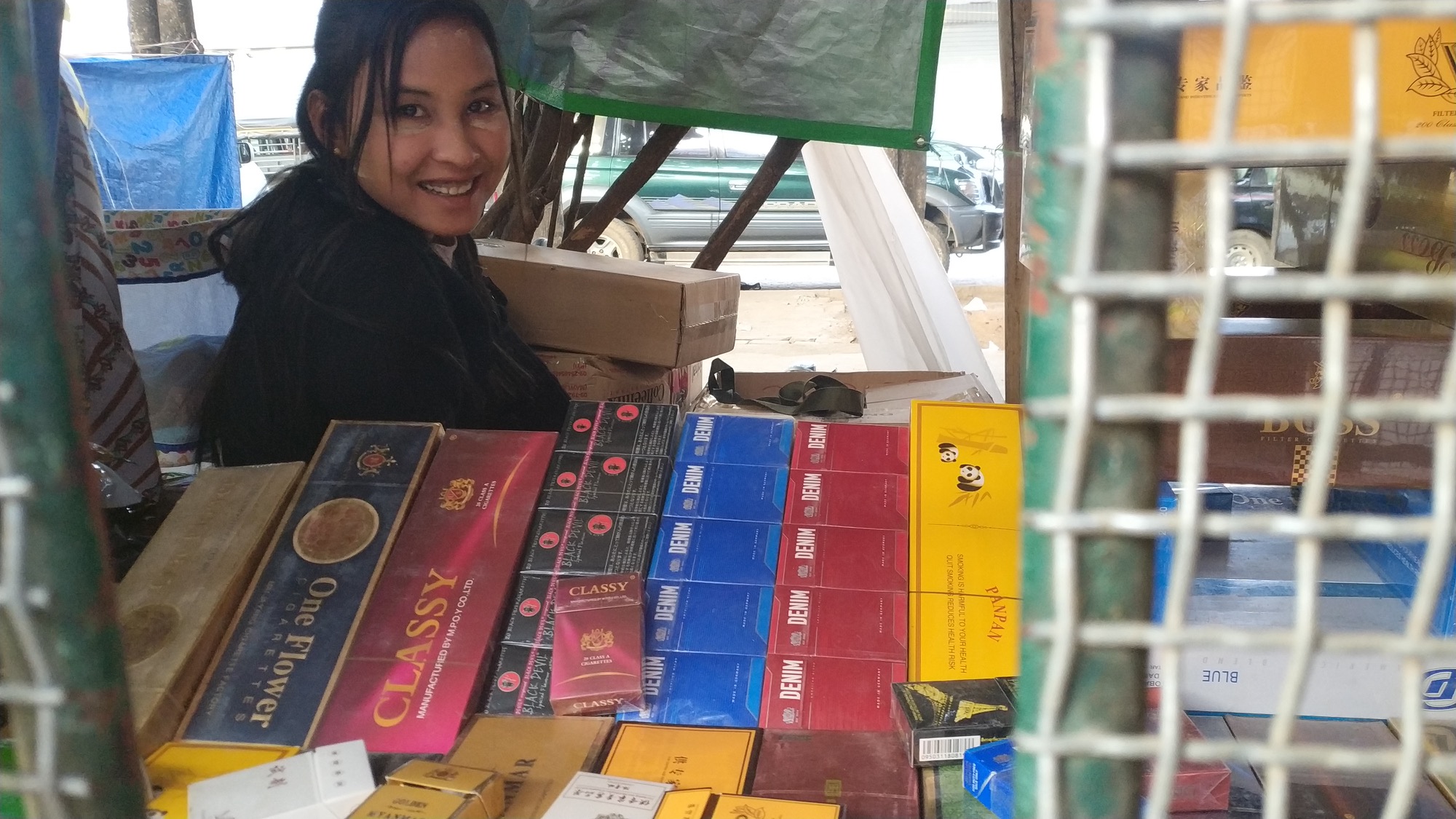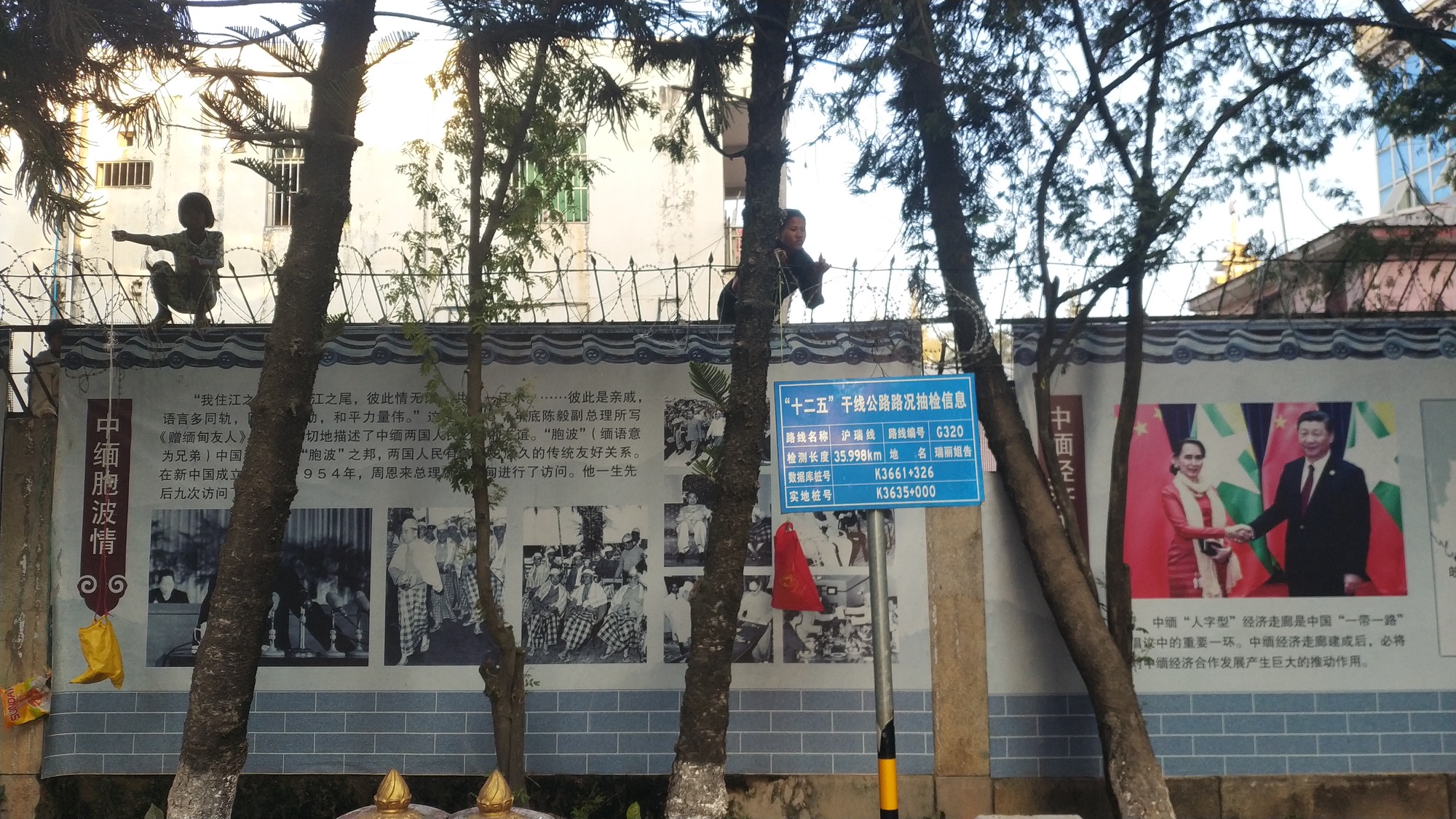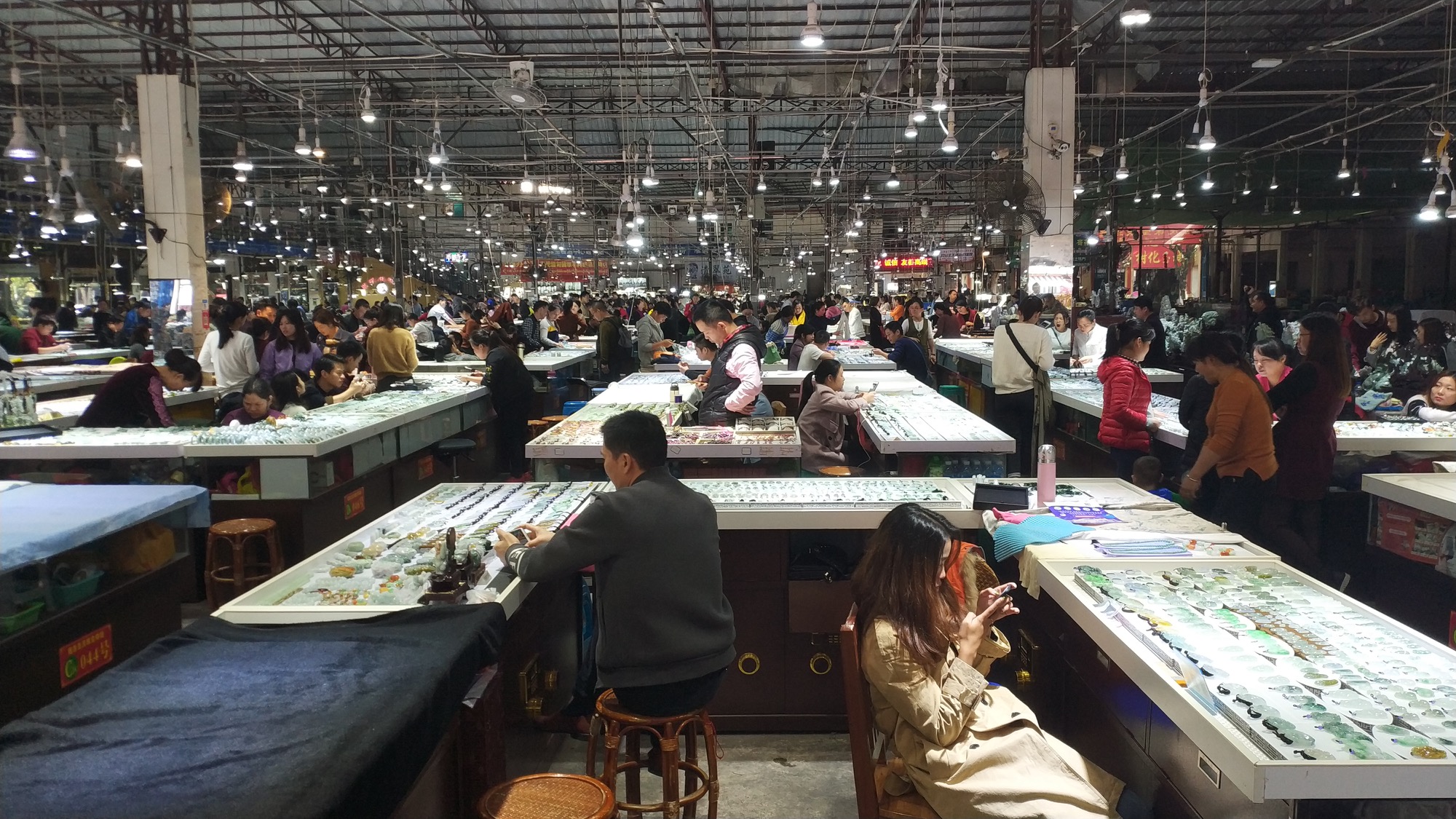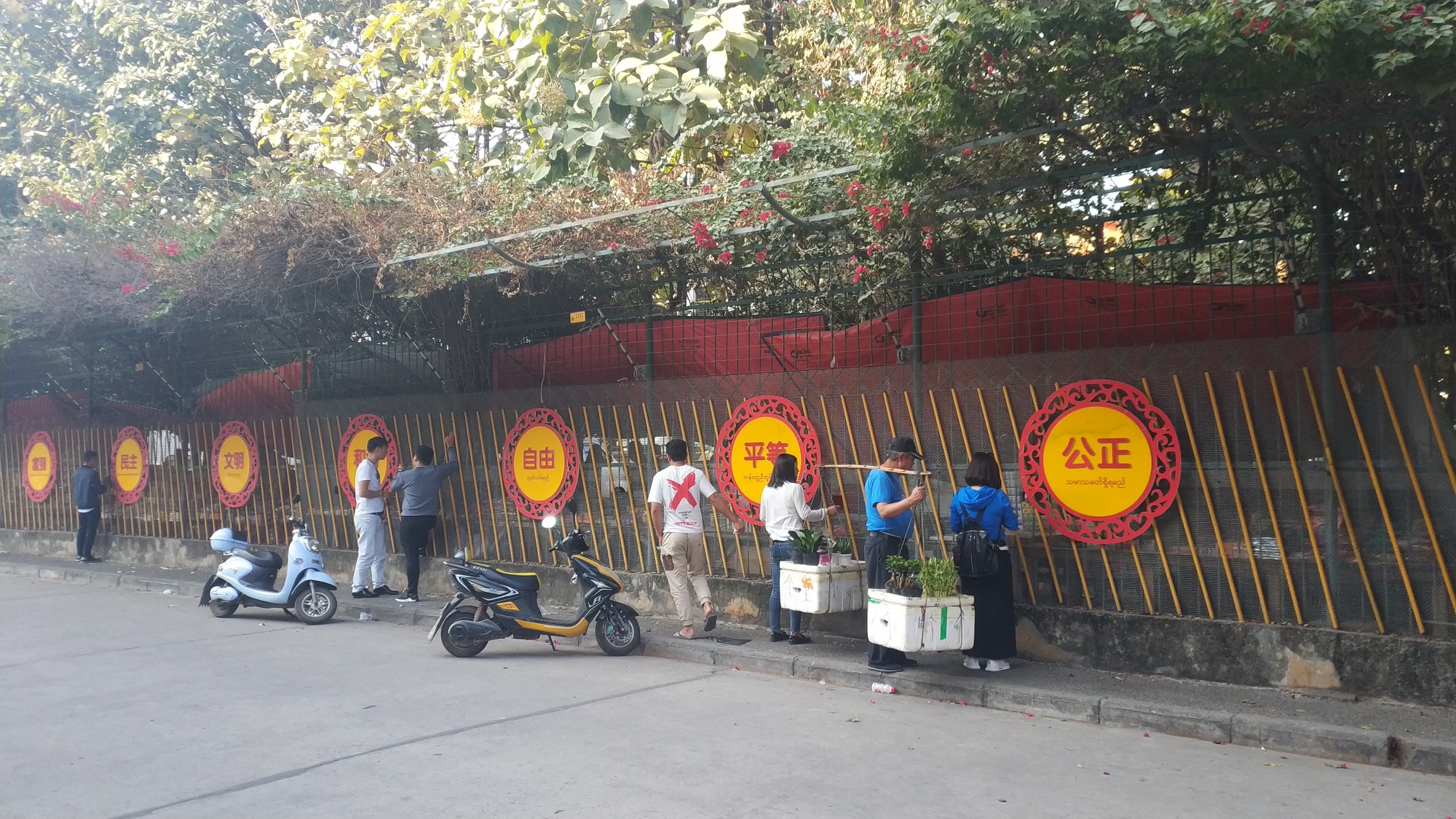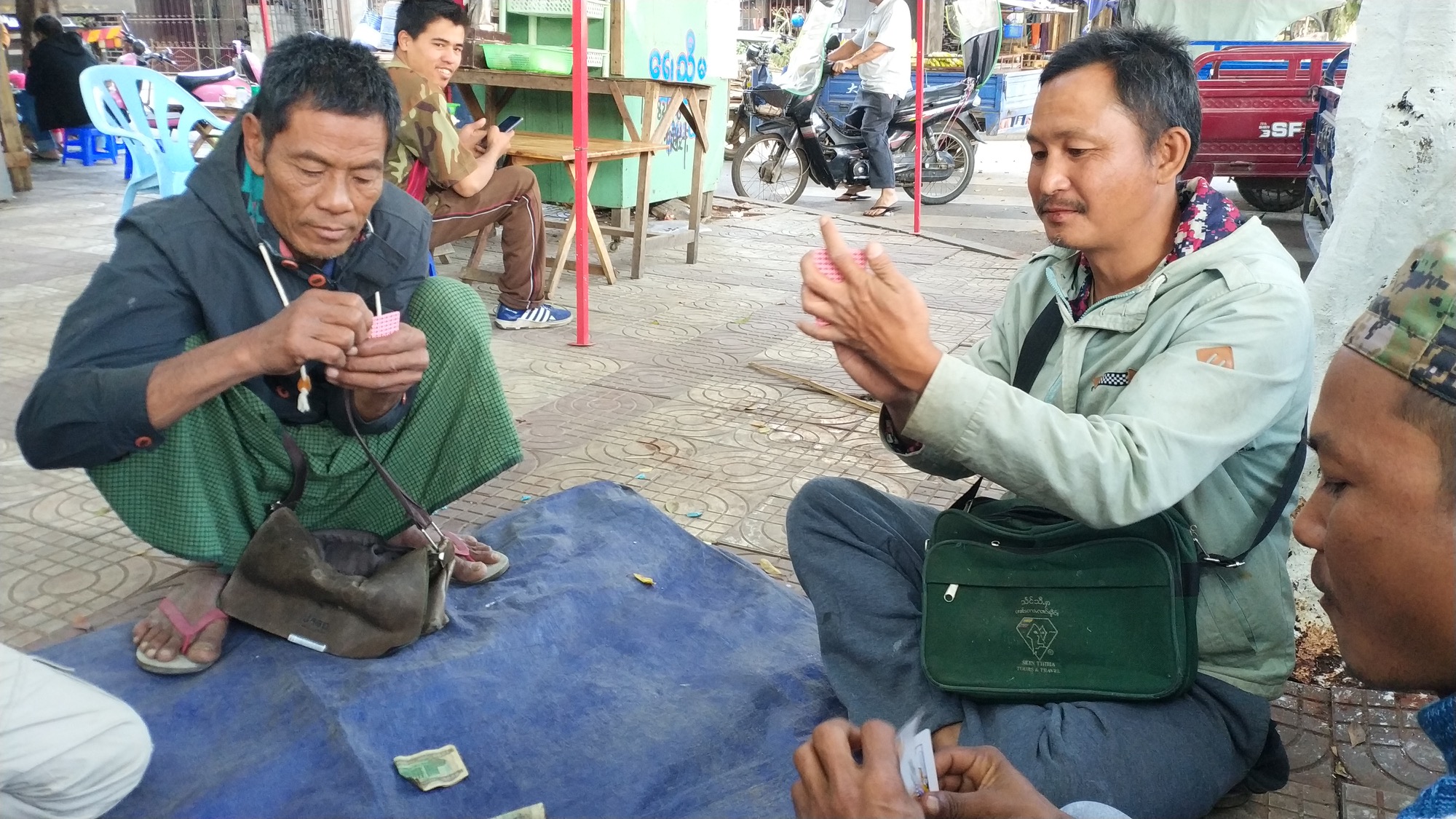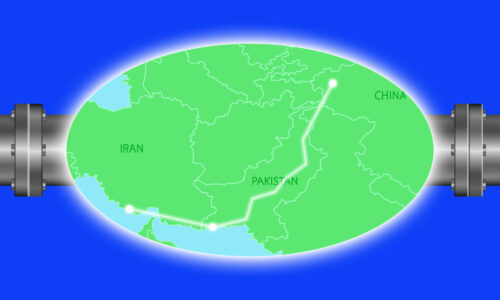On the border of China and Myanmar, commerce and consternation

The Chinese border town of Ruili is home to tens of thousands of Burmese, including a sizable Rohingya population that’s frustrated by Beijing’s efforts to ensure their crisis is not “internationalized.”
All photos by Nick Aspinwall

Every morning, a pack of Burmese vendors gather their wares and approach the fence separating Muse, a border town in Myanmar’s northern Shan state, from China’s Yunnan Province. Sheltered by palm trees, they slip snacks, herbal medicine, and boxes of cigarettes through small holes in the fence not much larger than milk cartons as Chinese border guards lazily observe the fracas. If an item is too large, they wait patiently until nobody’s watching and toss it over the border. Footsteps away, packed jade markets bustle as traveling buyers scrupulously examine the wares with magnifying glasses and consult with partners on WeChat video calls before breaking out into rapid-fire rounds of negotiation.
Trade is the beating heart of Ruili, the notorious final frontier of Yunnan as it meets Myanmar. Once famous for sex, drugs, and gambling, the city is hard at work burying its seedier side under a meteoric spree of development. While illicit KTVs and “massage parlors” still line the border fence, and shadier cross-border entrepreneurs deal in illegal timber and human trafficking, the two countries are preparing to make the area into a hub for China’s Belt and Road Initiative. China is currently building a high-speed rail line from Kunming to Ruili, with plans to stretch it onward to Mandalay and eventually to Myanmar’s Kyaukpyu port, which is slated to become a Chinese-backed special economic zone.
To China, Ruili is ground zero for its China-Myanmar Economic Corridor, an ambitious reach into the emerging economy of its southwestern neighbor. To tens of thousands of Burmese expatriates, Ruili is their economic lifeblood, the host of China’s hungry market for Burmese jade. For many, Yunnan is a refuge from the brutal conflicts which have long shaken Myanmar’s northern Kachin and Shan states.
The city also plays host to a small but significant Rohingya population, which locals say has grown since violence broke out in Rakhine state and spurred a humanitarian crisis.
In 2016, after spending nearly 15 years under house arrest during Myanmar’s long period of military junta rule, Aung San Suu Kyi ascended to power, ushering in an international hope that the country was on the verge of embracing democracy. It was short-lived. The Burmese military began a crackdown in late 2016 on Rohingya people in Rakhine state, forcing at least 700,000 Rohingyas to flee the country and causing over 24,000 deaths in what UN agencies and world leaders call a campaign of ethnic cleansing and genocide. The Rohingya, persecuted for decades and rendered stateless since the 1982 passage of the Burmese nationality law, have been subjected to extrajudicial killings, beatings, and sexual violence.
But while Aung San Suu Kyi’s silence earned her sharp condemnation from the international community, her most powerful neighbor stayed firmly in her corner. China has said it stands with Myanmar’s handling of the Rohingya conflict and has called for it to not be “internationalized.” The Chinese government is also working with Myanmar to repatriate Rohingya refugees in Bangladesh, but, according to recent reports, nobody wants to go back.
For the Rohingya of Ruili, China thus represents hope intertwined with a curse. For many — locals estimate the Rohingya population is somewhere between 3,000 to 20,000, although there are no official statistics — the robust China-Myanmar jade trade is a gateway to a better life. But they are deeply troubled by China’s staunch support for the Burmese government and military — and worried what that might mean for the future of their friends and relatives back home.
“I like the Chinese people,” said Mg Hla Sein, a Rohingya jade trader living in Ruili. “But I don’t like the Chinese government.”
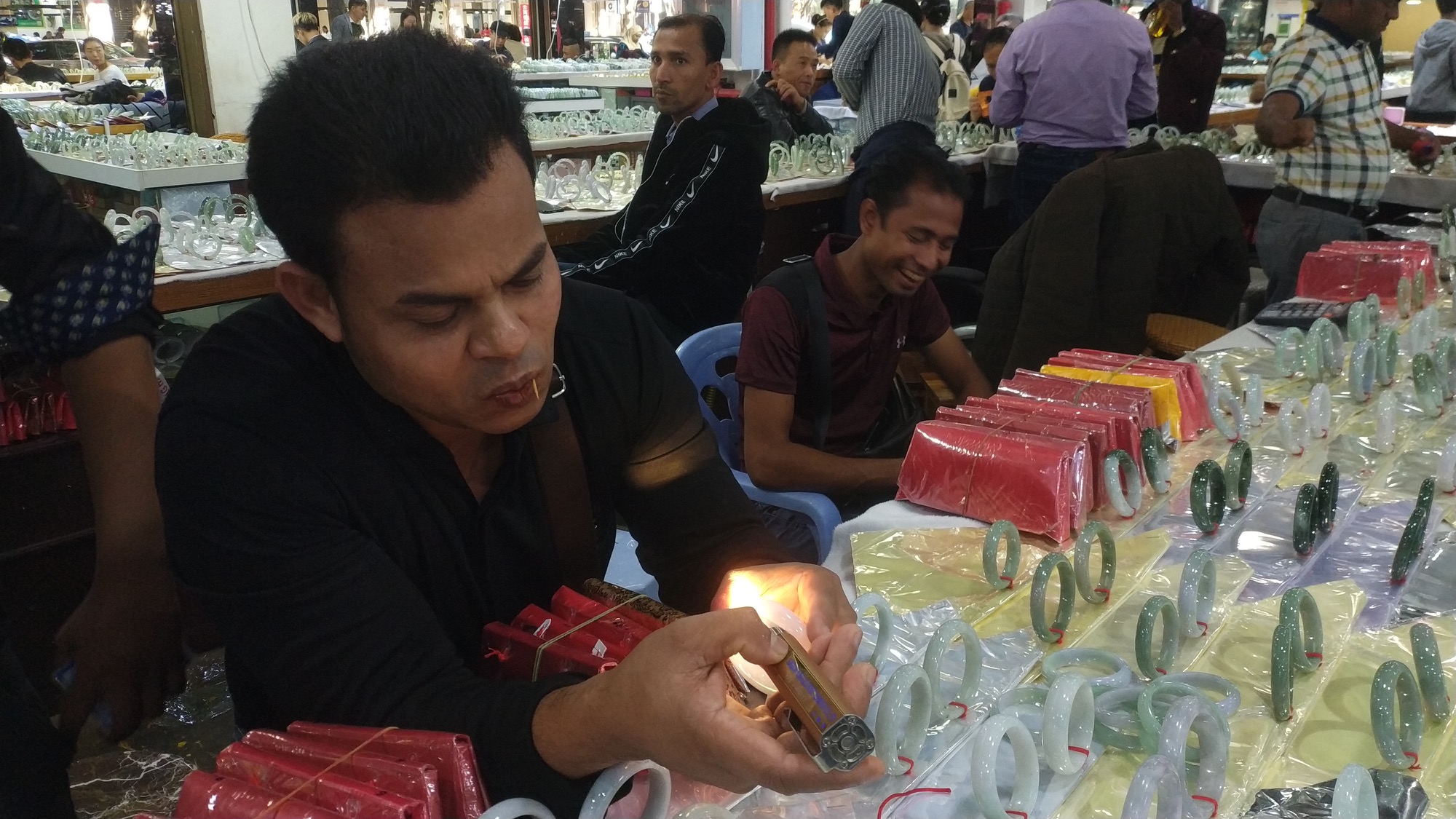
It’s a short walk from the jade markets of Jiegao, a special economic zone adjacent to Ruili, to the gate separating China from Myanmar, adorned with a billboard featuring Aung San Suu Kyi shaking hands with Xi Jinping — a constant reminder that China is laying the foundation to continue its staunch support for a Burmese regime that has overseen the Rohingya’s repression.
“Rohingya who fled to China are seeking safety from persecution, including atrocity crimes in Myanmar,” said John Quinley III, a Rohingya human rights specialist for the NGO Fortify Rights. “Rohingya [whom] I have spoken with believe China is standing in the way of accountability for Rohingya victims.”
This belief, similar to those held within other target countries of China’s Belt and Road investments, is that China prioritizes its economic ties with autocracies and unstable democracies over the rights of the citizens living within them. “China has investments in gas and oil, hydropower, jade, and other minerals,” Quinley said, which “have led it to push back on international calls for accountability.” Rather than pressuring the Burmese government to secure the human rights of its Rohingya population, China has reportedly offered Rohingya refugees US$6,000 to return from Bangladesh to Rakhine state — which also happens to be a crucial investment hub in the China-Myanmar Economic Corridor.
For the Rohingya of Ruili, China represents hope intertwined with a curse.
Mg Hla Sein and his fellow Rohingya in China live in a constant state of uncertainty. Unlike states such as Malaysia, the Chinese government does not grant refugee or asylum status to Rohingya Muslims. While Chinese law allows individuals to seek political asylum, the vast majority of displaced foreigners from Myanmar are not considered refugees. Most enter the country on temporary border passes, valid for up to three months at a time, which do not allow holders to seek legal employment in China or to travel into the country beyond the borders of Ruili. “I can’t go to Mangshi,” said one Rohingya man in Ruili, referring to a nearby city and the home of the region’s only airport. “I can’t go to Kunming.”
“I’ve been here for 10 years,” said the native of the Rakhine capital of Sittwe, who asked to remain anonymous as he cannot legally reside in China; as Myanmar does not recognize Rohingyas as citizens, it is prohibitively difficult for him to obtain a passport. Most of his 10 years have thus been spent in limbo. He is afraid to venture any further into Myanmar than Muse, leaving him essentially stuck in Ruili with his wife and two children. The family relies financially on the goodwill of fellow Burmese Muslim jade traders. “If a friend makes a big sale, he might give me 100 RMB ($14),” he said. “I live off of this.”
Multiple Rohingya I spoke to described a system of mutual goodwill among their small community, who use WeChat groups to look out for each other in China and stay in touch with their relatives in Rakhine state, and in the refugee camps of Bangladesh. Mg Hla Sein, who lives in Ruili with his wife, spent time in Bangladesh before coming to China. He sends some of his jade earnings back to his friends and relatives in the camps. Some of the money goes to his parents and sister in Rakhine state, who he hasn’t seen in years. “I cannot go back,” he said, raising his voice as his face contorted into a frown. “I don’t have citizenship.”
Earnings from commerce in China are an immediate lifeline for Rohingya supporting their displaced and stateless family members. But they come with a constant reminder of China’s growing closeness to a Myanmar regime that has been condemned by the United Nations of human rights abuses against its Rohingya population.
Since becoming Myanmar’s state chancellor, Aung San Suu Kyi has worked to consolidate her country’s ties with China. The Burmese leader was in attendance at the second Chinese Belt and Road Forum in April 2019, where she and Chinese Premier Li Keqiang signed three agreements to spur cooperation on the China-Myanmar Economic Corridor, a key node of Beijing’s larger array of Belt and Road projects.
In Myanmar, public concern is growing over these Chinese infrastructure projects, as they could lead to insurmountable debt and cause environmental crises — these are similar concerns from other Southeast Asian countries. For Myanmar’s persecuted minorities, each handshake between China and Myanmar symbolizes a strengthening partnership between an oppressive regime and a powerful, eager neighborly supporter.
The Myanmar government values Beijing’s support in helping it resolve ethnic conflict on its own terms, according to K. Yhome, a senior fellow with the New Delhi-based Observer Research Foundation who has researched China-Myanmar border areas. China, meanwhile, is determined to “use crises like the Rohingya to align themselves to get closer to the Myanmar government” and pursue key strategic projects, he said, such as the railway from Kunming to Mandalay and the Chinese-funded Kyaukpyu port project, located in Rakhine state.
China shares a border with Kachin state, home to an ongoing conflict between government soldiers and Kachin insurgents. Tens of thousands of Kachin people have fled to China since fighting resumed in 2011, where they have settled in makeshift refugee camps on the border and entered the cross-border jade trade, which remains the lifeblood of the Kachin economy.
China has played an active role in managing peace talks between Kachin forces and the Burmese government, which has been accused of atrocities in the conflict, including the blocking of humanitarian aid to displaced Kachin civilians. Beijing’s objective, according to Yhome, is to keep the fighting on its borders out of earshot from the international community — and away from its key infrastructure projects in the region. “They’ve put pressure on the Myanmar government to bring down military activity in the borderlands by China,” he said, including lobbying for involvement in peace talks when conflicts become violent. “They don’t want violence to keep occurring there and [start attracting] international media.”
“There has not been much development in terms of forwarding the peace process there,” Yhome said, but as this stagnation has not disrupted its ambitious Belt and Road projects, Beijing has nonetheless managed to get what it wants.
“This is not new in the China-Myanmar borderland,” he continued, referring to the migration of Kachin people into China. As long as Kachin people refrain from political organization while in China, he said, it is unlikely to be a concern to the Chinese. Ruili has long been notorious for its porous border; holes in the fence that now barely fit a carton of cigarettes used to be large enough for people to covertly slip from Myanmar to China and back.
These days, the fence has been reinforced as part of the city’s makeover from lawless outpost to the fulcrum of bilateral trade. “The level of border security has been scaled up,” Yhome said. China carefully monitors all who pass, including the Rohingya population in Ruili. “I don’t think the Chinese are worried about the presence of the Rohingya,” he said — as long as the community stays quiet, Chinese leadership will not be inclined to raise their international profile.
This is where the Chinese government and the Rohingya of Ruili differ. When I mention the billboard of Xi Jinping and Aung San Suu Kyi, less than a kilometer from Mg Hla Sein’s jade stall, he scoffs. “Our governments are best friends,” he said. “My government is killing us, day by day.”
Next to the billboard of the two grinning leaders touting the Belt and Road’s deliverance of economic prosperity to Myanmar, Burmese children climb behind the border fence to beg for money, dangling plastic bags tied to strings in front of Chinese tour groups in the midst of posing for photos. The visitors gawk at the scene and wave to the children; some stuff banknotes into the baskets. A call comes and the last of the tour groups scurry away, clutching bags filled with souvenirs and jade trinkets. The children descend behind the faces of Xi Jinping and Aung San Suu Kyi and walk back into town, their shadows visible through the border fence.
I asked the owner of an adjacent jade shop whether this was a regular occurrence. She smiled and nodded affirmatively. “They’ll be here tomorrow morning,” she said. “They come every day.”

